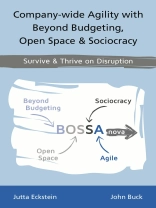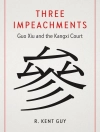Notes to the 2nd edition:
This second edition reflects such updates as: the new Agile Fluency Model, the renaming / rebranding of Statoil to Equinor, and some small additions to complexity. We also enhanced the description of Organizational Open Space and explain how it differs from Liberating Structures.
Enjoy insights in the book shared by Jez Humble, Diana Larsen, James Shore, Johanna Rothman, and Bjarte Bogsnes. Find out what Spotify, ING, Ericsson, and Walmart say in the book.
Quotes from early readers:
- “[This is] a very important book. My hopes are that it will be the missing link between agile for teams and the flexible, adaptive and humane organisations we want to build. It’s a great book. Thanks for writing it!” ~Sandy Mamoli, author of Creating Great Teams
- “Just as Spotify has worked hard to make all aspects of product development align well and work together – I see Jutta and John in this book exploring methods and processes that will work very well across the whole company.” ~ Anders Ivarsson, Spotify
- “I love how those practices [are] integrated and summarized into actionable recommendations.” ~ Yves Lin, Titansoft
- “Really wonderful balance of structure and space, rigor and creativity, that you’re suggesting.” ~ Michael Herman, Openspaceworld.org
- “Company-wide Agility with Beyond Budgeting, Open Space and Sociocracy […] makes an important case for companies to regard trust and autonomy the norm, rather than a privilege. […] Overall a great overview of how leaders can reimagine the way power is distributed within their companies.” ~ Aimee Groth, Author of The Kingdom of Happiness: Inside Tony Hsieh’s Zapponian Utopia
This book invites you to take a new perspective that addresses the challenges of doing business in a volatile, uncertain, complex, and ambiguous world.
Table of Content
Acknowledgments
Introduction
I Gathering the Band
1. Today’s Challenges
1.1 Challenges For Companies
1.2 Challenges With Expanding Agile
1.3 Summary of the Overall Challenge
2. Tuning the Instruments
2.1 Developments We Considered
2.2 Tools For Analysis
2.3 Considered But Didn’t Use
2.4 Converging Streams
Beyond Budgeting / Open Space / Sociocracy / Agile
2.5 Summary
II Improvising the Tune
3. Self-organization
3.1 Challenges for Self-Organization
3.2 Perspectives from the Different Streams
Beyond Budgeting / Open Space / Sociocracy / Agile
3.3 Additional Perspectives
3.4 The New Synthesis – Self-Organization
4. Transparency
4.1 Challenges with Implementing Transparency
4.2 Perspectives from the Different Streams
Beyond Budgeting / Open Space / Sociocracy / Agile
4.3 The New Synthesis – Transparency
5. Constant Customer Focus
5.1 Challenges with Establishing Company-wide Customer Focus
5.2 Perspectives from the Different Streams
Beyond Budgeting / Open Space / Sociocracy / Agile
5.3 The New Synthesis – Constant Customer Focus
6. Continuous Learning
6.1 Challenges for Continuous Learning
6.2 Perspectives from the Different Streams
Beyond Budgeting / Open Space / Sociocracy / Agile
6.3 Additional Perspectives
6.4 The New Synthesis – Continuous Learning
7. A New Tune
7.1 A New Organigram
7.2 Summary: The Four Values As Instruments in the Band
7.3 Final Thought
III Shall We Dance?
8. Strategy
8.1 Trust
8.2 Alignment
8.3 Equivalence
8.4 Experimentation
8.5 Reflection
9. Structure
9.1 Cross-Functional Teams
9.2 Relationship with Customer
9.3 Feedback
9.4 Reflection
10. Process
10.1 Meeting Techniques
10.2 Understanding Your Customer
10.3 Production
10.4 Feedback
10.5 Innovation
10.6 Reflection
11. Dance Around the Clock
11.1 Revisiting the Challenges from Chapter 1
11.2 How to use the probes
11.3 Now Roll Your Own
11.4 Strengthening Fluency
IV Party Time
The Four Values
Connected Perspective
Societal Awareness
Summary
Bibliography
Appendix
Beyond Budgeting Principles / Open Space Principles / Sociocracy Principles / Agile Principles
About Jutta Eckstein
About John Buck
Other Books by the Authors
Index
About the author
John Buck is President of Governance Alive LLC, an international training and consulting organization headquartered Washington, DC, USA. The firm also offers mediation and meeting facilitation services. John has taught many training workshops on sociocracy and led many implementation projects for a variety of organizations, more recently expanding to include BOSSA nova. He serves on the boards of various other organizations. His research and development is ongoing. For example, he is working with Fujitsu’s advanced software lab to develop Weaver, software that helps meetings go better – in-person, online, and asynchronous.
John Buck has extensive management experience with government and corporations, including managing large information technology projects. His clients span the globe and include plastics manufacturers, schools, colleges and universities, long-term care facilities, co-housing groups, NGOs, food producers, and software companies. He holds an MA in Quantitative Sociology from The George Washington University.












